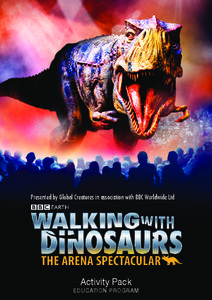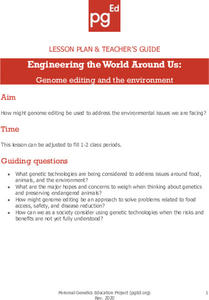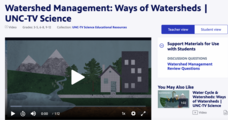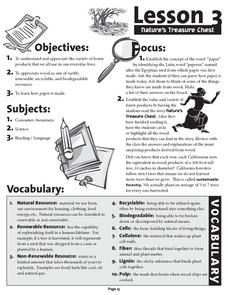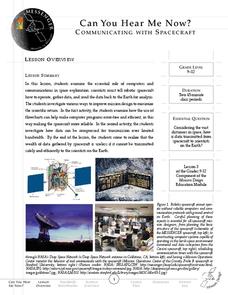Berkshire Museum
Where’s the Water?: Acting Out Science Cycles
Young scientists transform themselves into rivers, oceans, clouds, and drops of water in order to explore the water cycle. After assigning and explaining to students their different roles in the activity, the teacher reads aloud a...
Ventura County Air Pollution Control District
Effects of Global Warming
Your learners have probably heard of climate change, but do they really understand what it is? Study the history, details, and future implications of global warming and the greenhouse effect with a set of activities designed for an...
BBC
Walking with Dinosaurs
Breath new life into your class's study of dinosaurs with this extensive collection of materials. Offering everything from a printable T-rex mask, word searches, and connect-the-dots activities to informational handouts, hands-on...
Personal Genetics Education Project
Engineering the World Around Us: Genome Editing and the Environment
Challenge young minds to build a better world with genetic engineering. Biologists learn potential solutions for environmental issues using genome editing while interacting with three case studies. Scholars read articles and view...
PBS
Watershed Management: Ways of Watersheds | UNC-TV Science
Inspire young conservationists to protect the environment with a short activity on water quality and watersheds. Participants discover the importance of watershed management, learn about water quality problems, and discover possible...
Nevada Outdoor School
Let It Snow! Let It Melt!
Winter weather offers a great opportunity to teach young scientists about the states of matter. This activity-based lesson includes a range of learning experiences, from experimenting with the rate at which ice melts to singing a song...
American Forest Foundation
Who Speaks for the Trees?
Help young conservationists appreciate the important role that trees play in ecosystems around the world with this collection of six engaging activities. From a shared reading and class discussion of Dr. Seuss' The Lorax, to in an depth...
UAF Geophysical Institute
Carbon Footprint
Your young environmentalists can calculate their carbon footprint and discuss ways to reduce it with a worksheet about climate change. After reading a handout about what impact one's carbon footprint can have on the environment, kids...
PBS
Technology: Conveniences and Consequences
It's a delicate balance—using technology to improve our lives while still protecting the environment, and ourselves, from the hazards of technology use. Class members examine statistics about the increase in media use, complete a survey...
Wilderness Classroom
Pollution
Educate scholars on pollution—air, water, and land—with a series of lessons that begin with a thorough explanation of each type. Learners then take part in three activities to reinforce the importance of reducing pollution. They...
NOAA
Sustaining Our Ocean Resources
Lead young scientists on an investigation of fishery practices with the final installment of this four-part unit. Using a PowerPoint presentation and hands-on simulation, this activity engages children in learning how fish populations...
Michigan State University
Gases Matter
Young scientists learn that seeing isn't necessarily believing when it comes to the states of matter. After performing a fun class demonstration that models the difference between solids, liquids, and gases, children complete a series of...
Forest Foundation
The Web of Life
Producers, herbivores, carnivores, omnivores, decomposers. To begin a study of the forest ecosystem, learners examine the connections among the members of ecological communities.
Forest Foundation
Nature's Treasure Chest
Renewable, recyclable, and biodegradable. As part of their study of the forest ecosystem, class members read "Nature's Treasure Chest" about the many products made from trees and then craft their own recycled paper.
K-State Research and Extensions
The Crusty Earth
Geology rocks — literally! A geology chapter offers eleven activities at four different levels. Scholars enjoy completing hands-on experiments before applying critical thinking skills following a share, process, generalize, apply, and...
It's About Time
Present-Day Climate in Your Community
So what exactly is climate? This first installment of a six-part series introduces the concept of climate using real-world data tables and topographic maps. The timely lesson includes a comprehensive overview of climate, as well as...
Forest Foundation
Forest Watersheds
Where does the water we use come from? To understand the concept of a watershed, class members study the water cycle and then engage in an activity that simulates a watershed.
NOAA
Understanding Food Chains and Food Webs
Jump into an exploration of marine ecosystems with the first lesson in this four-part series. After first learning about crustaceans, mollusks, and other forms of sea life, young marine biologists view a PowerPoint presentation that...
Messenger Education
Exploring Solar Systems Across the Universe
Scientists have theorized that our solar system formed 4.6 billion years ago. In this pair of activities, learners first hypothesize how our solar system was formed. Using this information, groups then determine how scientists search for...
Messenger Education
Can You Hear Me Now?—Communicating with Spacecraft
Radio signals transmitted to Pluto take five hours to reach their destination! In these two activities, young scientists explore data communication in space. In activity one, pupils learn how data is gathered and sent back to Earth....
Teach Engineering
Introduction to Environmental Engineering
A series on environmental engineering introduces the class to issues that environmental engineers work to solve. This first lesson focuses on air and land issues, and looks at ways to reduce pollution.
Carnegie Mellon University
Bathtub Model
Using a colorful infographic handout and a guide sheet, hold a class discussion about how a bathtub can serve as a model for the greenhouse effect created by Earth's atmosphere. Participants will understand that as energy or matter is...
Drexel University
Learning Roomba Module 2: Robot Configurations
How do robots move? A presentation shows viewers the different types of configurations of that help robots move and lists the advantages and disadvantages of each of the configurations.
Drexel University
Learning Roomba Module 4: Sensors and Actuators
Introduce your classes to sensors and actuators in robots — specifically to the Roomba. Pupils develop programs that make Roomba utilize its different sensors.
Other popular searches
- Living Environment Science
- Environment Science Labs
- Land Use Environment Science
- Environment Science Dilemma
- Environment Science Graphing
- Environment Science Air
- Environment Science Mcuk
- Environment Science Muck
- Environment Science Vocab
- Science Environment
- Environment Science Hands On
- Science and the Environment




